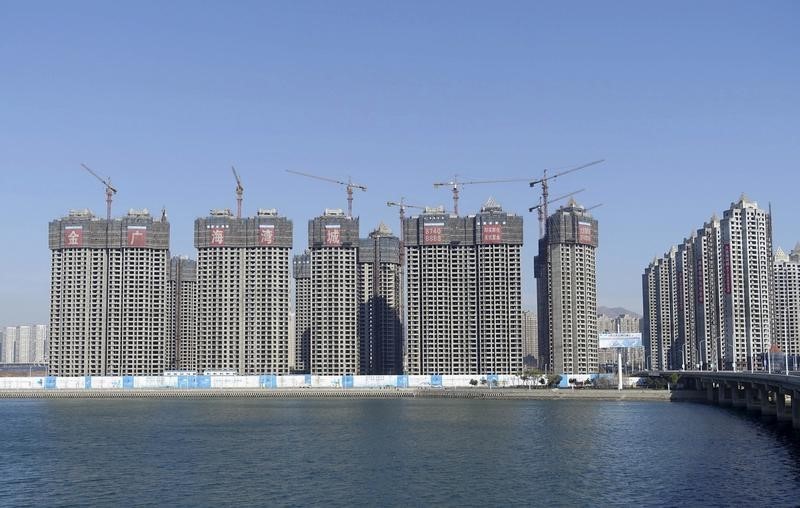By Yawen Chen and Kevin Yao
BEIJING (Reuters) - Investment growth in China's real estate quickened slightly over January-August, suggesting investors still have confidence in a booming market even as more local governments tightened restrictions on home purchases in a bid to check rapid price rises.
Property investment in January-August rose 5.4 percent from a year earlier, the National Bureau of Statistics (NBS)figures showed on Tuesday, quickening from an increase of 5.3 percent in January-July, while property sales by floor area grew 25.5 percent, slowing from 26.4 percent.
In August alone, property investment was up 6.2 percent from a year ago, according to Reuters calculations, compared with 1.4 percent in July.
"A property investment rebound means it will continue to contribute positively to gross domestic product this year, albeit probably not as significantly as seen in the first half," said Ma Xiaoping, economist at HSBC.
Real estate investment directly affects about 40 other business sectors in China and is considered to be a crucial driver for the economy.
A robust recovery in home prices and sales, thanks to a flurry of government stimulus measures, gave a stronger-than-expected boost to the world's second largest economy in the first half of the year.
But rapid price gains in some of the biggest cities fanned fears of a bubble and prompted some local governments to tighten home and land purchase requirements, with cities such as Xiamen, Suzhou, Naning and Wuhan being the latest to implement such measures.
"Rises in property prices have initially been contained," NBS spokesperson Sheng Laiyun said at a news conference.
A housing glut continued to take its toll in smaller centers such as rustbelt city Shenyang, which implemented looser buying conditions in an effort to ramp up demand.
"Micro policies at the local level are expected to be implemented to help grow sales in these cities, but a broad policy by the central government to encourage that is unlikely," said HSBC's Ma.
China's central bank has become increasingly concerned at the severity of the country's debt problem, with the high concentration of capital in property identified as a major problem.
"We should take a lot of measures to curb excessive bubbles in the real estate sector, curb the flow of excessive financial resources into the real estate sector," Ma Jun, chief economist at China's central bank, said in a recent interview.
The debt ratio of property developers is now nearly 80 percent and climbing, according to a commentary published in the official Xinhua news agency's Economic Information Daily.
The commentary warned of "irrational increases in leverage" as more home buyers rushed to invest in the overheated real estate market through borrowing. Household loans, which are mainly mortgages, made up over 90 percent of new loans in July, according to official data.
The commentary said volatility in house prices may cause either a deterioration in financial assets or soak up more capital to prop up the leverage that was threatening to undermine economic policy.
New construction starts in August were up 3.3 percent from a year ago, measured by floor area, Reuters calculations showed, slowing from 8.1 percent in July.

Growth in inventory floor area last month was 6.9 percent higher than a year earlier, compared to 7.7 percent in the previous month.